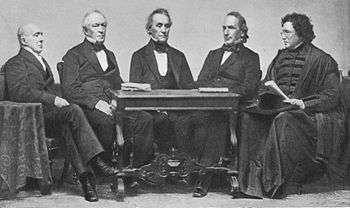President and Fellows of Harvard College
The President and Fellows of Harvard College (also called the Harvard Corporation) is the smaller of Harvard University's two governing boards, the other being its Board of Overseers.
History
In 1650, at the request of Harvard President Henry Dunster, the Great and General Court of Massachusetts issued the body's charter, making it now the oldest corporation in the Americas; the subsequent Constitution of the Commonwealth of Massachusetts confirmed that, despite the change in government, the corporation would continue to "have, hold, use, exercise and enjoy" its property and legal privileges.[1] Although the institution it governs has grown into Harvard University (of which Harvard College is one of several components), the corporation's formal title remains the President and Fellows of Harvard College.

The corporation was probably originally intended to be a body of the school's resident instructors, similar to the fellows of an Oxbridge college. However, it fell into the now-familiar American model of a governing board—an outside body whose members are not involved in the institution's daily life, which meets periodically to consult with the day-to-day head, the president (whom it appoints). The Corporation is self-perpetuating, appointing new members to fill its own vacancies as they arise.
For most of its history, the Corporation was consisted of six fellows in addition to the president. But after the abortive presidency of Lawrence Summers and a large endowment decline in 2008–2009, a year-long governance review was conducted. In December 2010, it announced that the Corporation's "composition, structure, and practices" would be greatly altered: the number of fellows would increase from seven to 13, with prescribed terms of service, and several new committees would endeavor to improve the group's integration with the activities of the University as a whole, especially its long-term planning.[2]
Current Fellows
There are currently thirteen members of the Corporation.
References
- "Massachusetts Constitution, Chapter V".
- "Governance Review Culminates in Changes to Harvard Corporation". Harvard Gazette. Cambridge, Massachusetts: Harvard University. December 6, 2010. Retrieved December 6, 2010.
- "Three to join Harvard Corporation". Harvard Gazette. Harvard University. May 25, 2011. Retrieved June 15, 2015.
- "Breyer elected to Harvard Corporation". Harvard Gazette. Harvard University. February 4, 2013. Retrieved June 15, 2015.
- "Kenneth Chenault and Karen Gordon Mills to join Harvard Corporation". Harvard Gazette. Harvard University. February 10, 2014. Retrieved June 15, 2015.
- "Finnegan elected to Corporation". Harvard Gazette. Harvard University. May 23, 2012. Retrieved June 15, 2015.
- "Harvard Corporation elects two new members". Harvard Gazette. Harvard University. May 23, 2018. Retrieved October 20, 2018.
- "Mathews and Wells elected to Harvard Corporation". Harvard Gazette. Harvard University. September 23, 2012. Retrieved June 15, 2015.